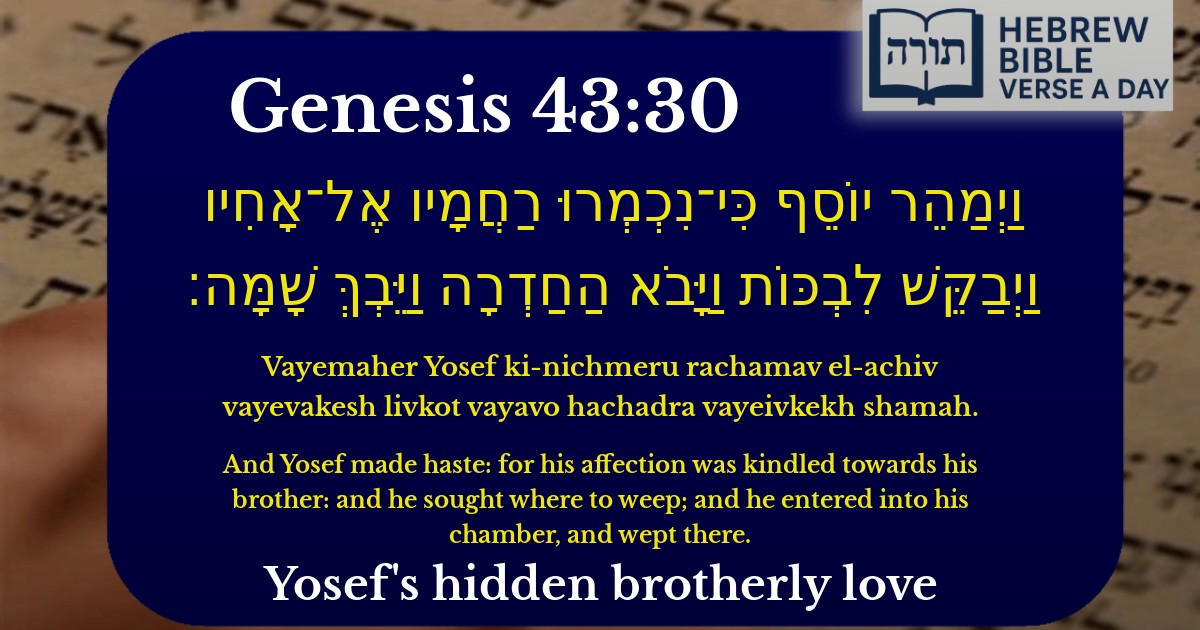Frequently Asked Questions
Q: Why did Yosef (Joseph) hurry to cry in private when he saw his brother Binyamin (Benjamin)?
A: According to Rashi, Yosef hurried to leave because he was overcome with emotion upon seeing his full brother Binyamin after many years. He didn't want to reveal his identity yet, so he went to a private room to cry. This shows Yosef's deep brotherly love while maintaining wisdom in his plan.
Q: What does this verse teach us about controlling emotions?
A: The Talmud (Chagigah 5b) learns from this that even when experiencing strong emotions, one should maintain composure when necessary. Yosef felt deep compassion but controlled himself publicly, only expressing his feelings privately. This teaches us the importance of emotional intelligence and proper timing for emotional expression.
Q: Why does the Torah mention that Yosef's 'affection was kindled' specifically for Binyamin?
A: The Midrash explains that Binyamin was Yosef's only full brother (both sons of Rachel), creating a special bond. Additionally, Binyamin wasn't involved in selling Yosef, so there was no resentment. This teaches us about the unique connection between siblings who share both parents and the purity of their relationship.
Q: What is the significance of Yosef going to a private chamber to cry?
A: Rambam (Hilchos De'os 2:3) teaches the importance of moderation in emotional expression. Yosef's actions demonstrate that while expressing emotion is natural and important, there are times when privacy is appropriate. This models healthy emotional expression - feeling deeply but choosing the right time and place to express it.
Q: How can we apply Yosef's behavior with his brothers to family relationships today?
A: This verse teaches us several lessons: 1) The power of forgiveness (Yosef had forgiven his brothers in his heart), 2) The importance of family bonds (his immediate emotional reaction), and 3) Wisdom in reconciliation (waiting for the right moment). These principles guide us in healing and maintaining family relationships according to Jewish values.


Rashi's Explanation of Yosef's Haste and Tears
Rashi (Bereshit 43:30) explains that Yosef's haste ("וַיְמַהֵר") demonstrates his overwhelming emotion upon seeing Binyamin, his full brother from Rachel. The term "נִכְמְרוּ רַחֲמָיו" (his affection was kindled) indicates a deep, natural brotherly love that could no longer be suppressed. Rashi notes that Yosef sought to weep privately ("וַיָּבֹא הַחַדְרָה") to avoid revealing his identity prematurely and to maintain his disguise as an Egyptian ruler.
Rambam on Controlling Emotions
Rambam (Hilchot De'ot 2:3) discusses the importance of balancing emotions. Yosef's actions reflect this principle—though overwhelmed with compassion, he restrained himself publicly and only wept in private. This demonstrates the ideal of שכל (intellect) governing מדות (emotions), a key concept in Jewish ethical thought.
Midrashic Insights on Yosef's Weeping
Ibn Ezra on the Phrase "וַיְבַקֵּשׁ לִבְכּוֹת"
Ibn Ezra notes that Yosef actively sought a place to weep ("וַיְבַקֵּשׁ לִבְכּוֹת"), indicating his deliberate effort to conceal his emotions from the Egyptians present. This highlights Yosef's wisdom in maintaining his royal demeanor while still expressing genuine familial love.
Kli Yakar on the Dual Nature of Yosef's Tears
The Kli Yakar (Bereshit 43:30) explains that Yosef wept both out of joy at seeing Binyamin and sorrow for the pain his brothers had caused their father Yaakov. This duality reflects the complexity of human emotions, especially in fraught family situations, a theme recurrent in Sefer Bereshit.